
15 minute read
Cover Story
Member Spotlight on Adam Portenier
Head Groundskeeper, Nashville Soccer Club
Advertisement
••••••••••
How long have you been working in the groundskeeping / turfgrass industry?
Probably around 16, I’m starting to lose track. Nine years in the MLS. I had five years at Dallas, and now I’m on my fourth year with Nashville Soccer Club. Before that I was in baseball, with the Texas Rangers for a year. I worked four years at Haymarket Park at the University of Nebraska, their baseball field. Then three or four years at Hastings Public Schools, taking care of their sports fields. That’s how I got my start.
How did you decide on a career in turfgrass management?
I started off my first time working through college for the Hastings Public Schools, taking care of athletic fields. My first round of college I got two associate degrees; one in Architectural Design, one in Construction Management. I ended up taking a three-year break where I was architectural coordinator for a company called HTR. Their primary design was hospital/healthcare. I did work on a project that pushed me back into college. It was TD Ameritrade Park in Omaha, the College World Series new stadium, which I was the project architectural coordinator on.
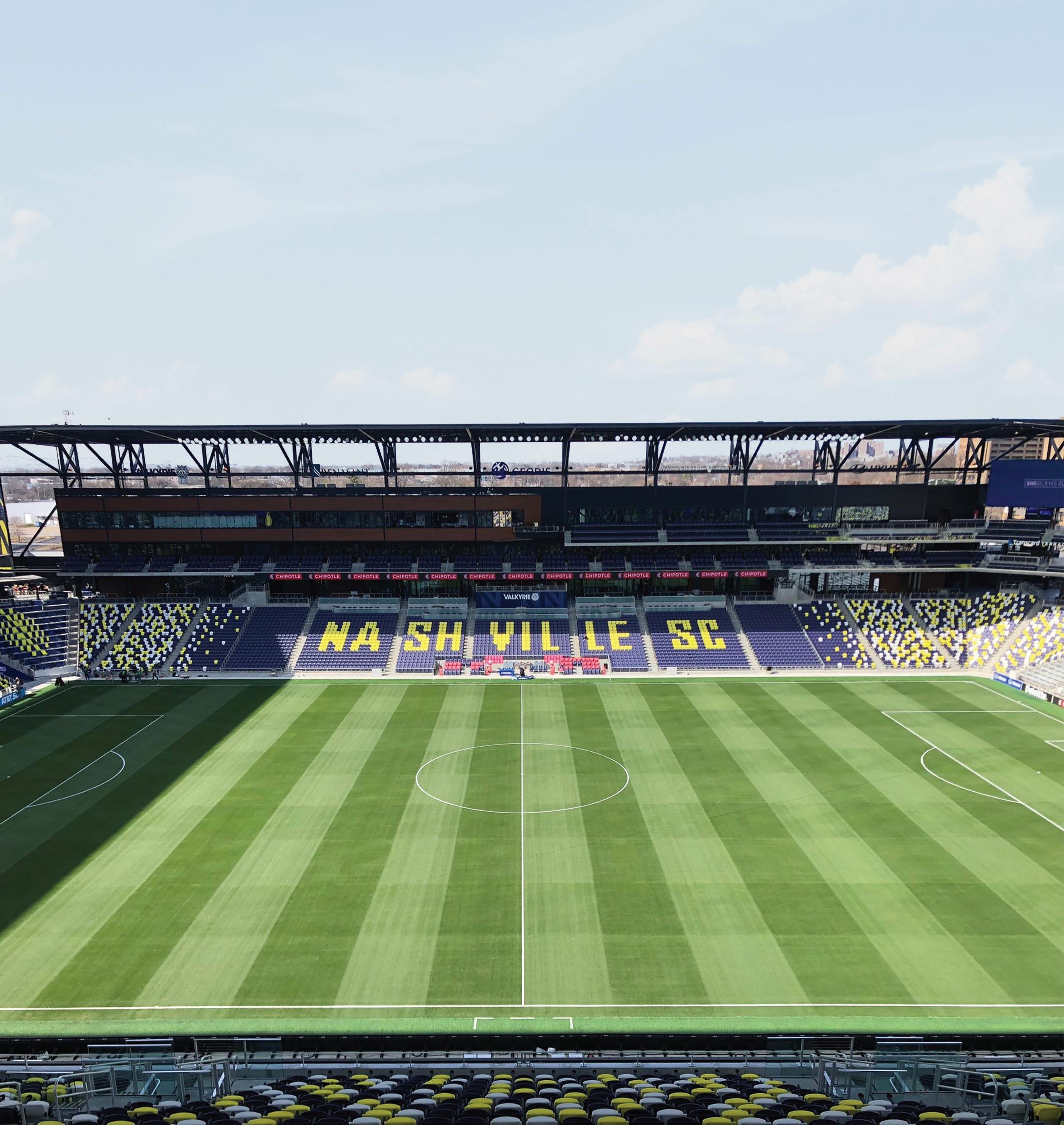
Working on that project, seeing the field design and the build, sent me back to the University of Nebraska, where originally I was going to get my Bachelor’s degree in construction management. At that point I was just tired of being in my office. I was in a cubicle Monday through Friday besides site visits. When I left college and left that job at Hastings Schools, it was by far my favorite job I ever had, working outside, working with grass. At that time though, I didn’t know how to get into the profession. I had no idea there were turfgrass science degrees out there.

When I went back to Nebraska, my first semester I was enrolled in construction management. One day I was just messing around online looking at what all they offer, and I came across their sports turf science program. I set up a meeting with the advisor for that and talked to her about 30 minutes. I think the last question I asked her was, ‘What jobs do I get after graduating with the degree?’ and she listed off some of her recent graduates working in baseball stadiums or golf, and that kind of sold me.
If there was an outcome where I was able to work at a stadium full time, every day, that was something that I wanted to do. I switched majors that week from construction management to sports turf science. That’s when I got into baseball, Haymarket Park. I worked there as an intern, then worked my way to a seasonal assistant, second assistant, then graduated and moved to Dallas.
Did the architectural design and construction management background prepare you for future jobs and this career?
Yes, especially for the Nashville SC job where I was part of the buildout of the stadium. We just recently opened our training facility. So when I got here, Currey Ingram was already built, which is our Academy facility. But when I was here and started getting brought in on those construction meetings, they’d put blueprints in front of me and start explaining, ‘this is keys’ and stuff like that, I didn’t have to read all that. That and construction processes, it definitely prepared me for this job and building this stadium and field. Then moving on to Antioch where our first team training facility is, it prepared me for the whole design and build process, what to expect, the steps through design/development, construction documents, then buildout.
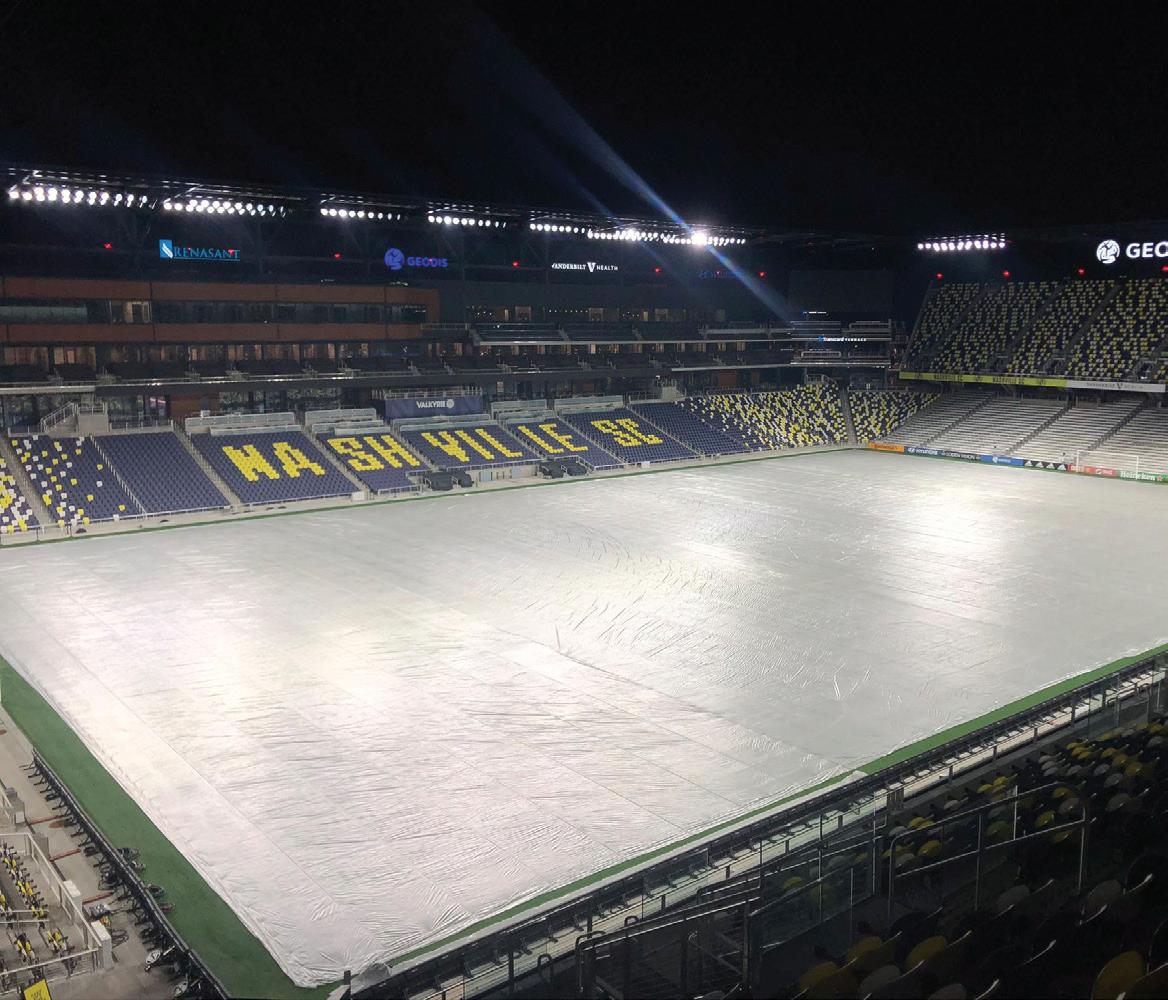
What is unique about your facilities now?
What makes them unique, but also what makes them tough to manage is right now we have three facilities in three different counties. We have our Academy facility in Brentwood where for the first three and a half years, that was where our first team trained. That was completed in October of 2019, and that’s when I started so that was completed before I got here. That was my first facility I managed in Nashville. Then we have our stadium in Davidson County, in Nashville, and now our first team training facility in Antioch.
Our brand is spread out throughout the Nashville area, so we touch a little bit of every part of Nashville. Which is good, it gets the brand out there, but managing all three facilities when they’re anywhere from 30–40 minutes apart depending on traffic can be challenging at times.
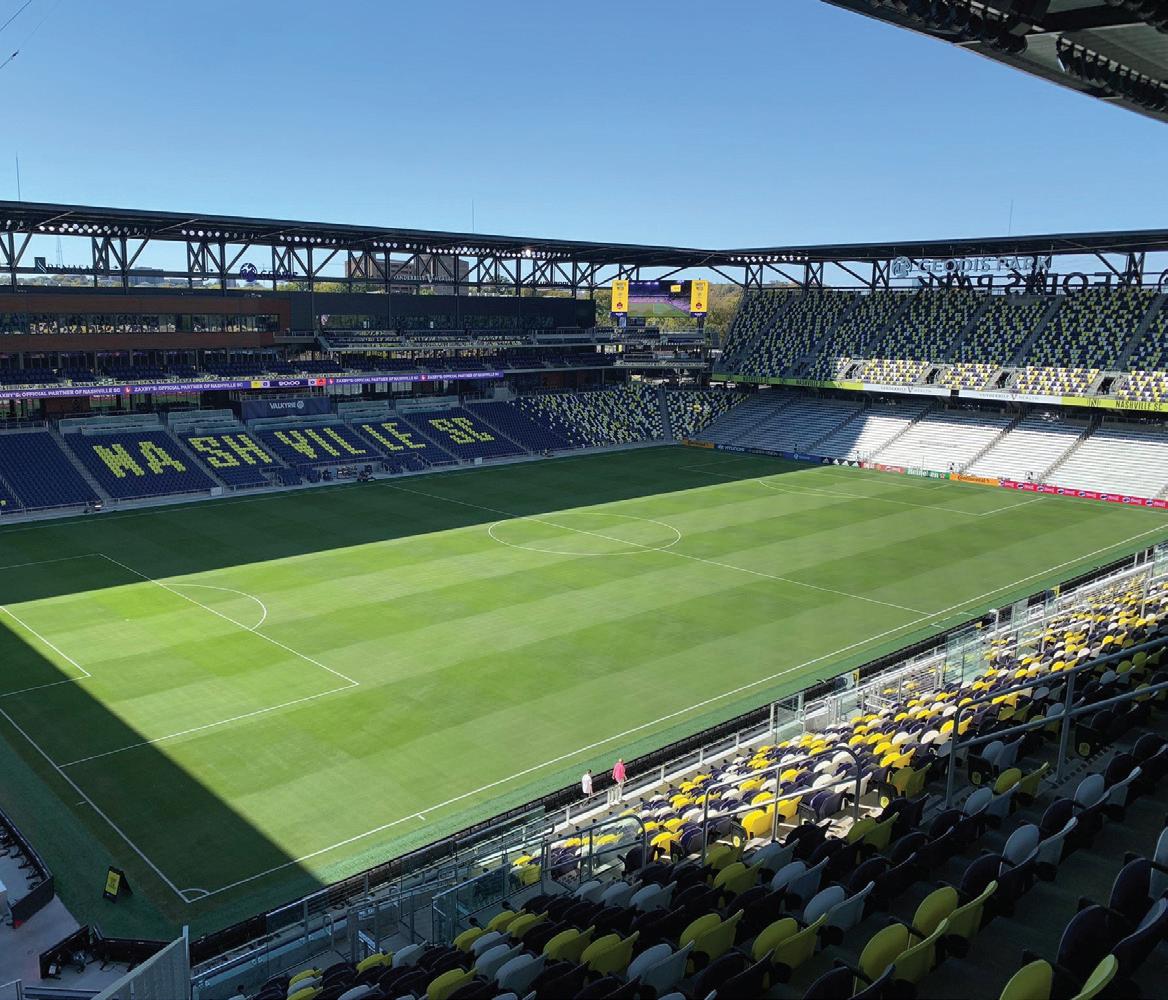
What does your crew look like?
The crew is still a work in progress. We’re only at four and a half. Four full time, then a part- time, plus me. That’s probably my main priority going forward is to get us properly staffed. It’s been something I continue to work through with our organization. We have two full time groundsmen at Currey Ingram. We have a full time and a part time at Antioch, and then I have a full time hourly groundsman here at the stadium. Throughout the week, depending on demand, I’ll move from facility to facility. It’s a little hectic, but I think we’ll get there eventually.

What needs do you still have on your team?
It’s always good to get people with the professional background, but my first assistant, Alex Polnow, he’s a turfgrass graduate from Iowa State. He’s over Antioch, which is the first team training facility. My second assistant, Tran Zerface is at the Academy facility, and he graduated from North Dakota State. The community agreement is we’re going to prioritize hiring locally, so for our hourly guys, we’re looking more local in the Nashville area, so really we’re getting guys who maybe not have the turf background, but we’ve gotten guys from parks and rec, golf courses that are just good labor workers. We did get lucky on the last hiring go-around where we had a guy originally from Nashville, Dalton Stanley who was at Atlanta United for the last couple of years, he’s a turfgrass graduate from UT. We were able to bring him onboard because he was from the area, so that worked out in our favor.
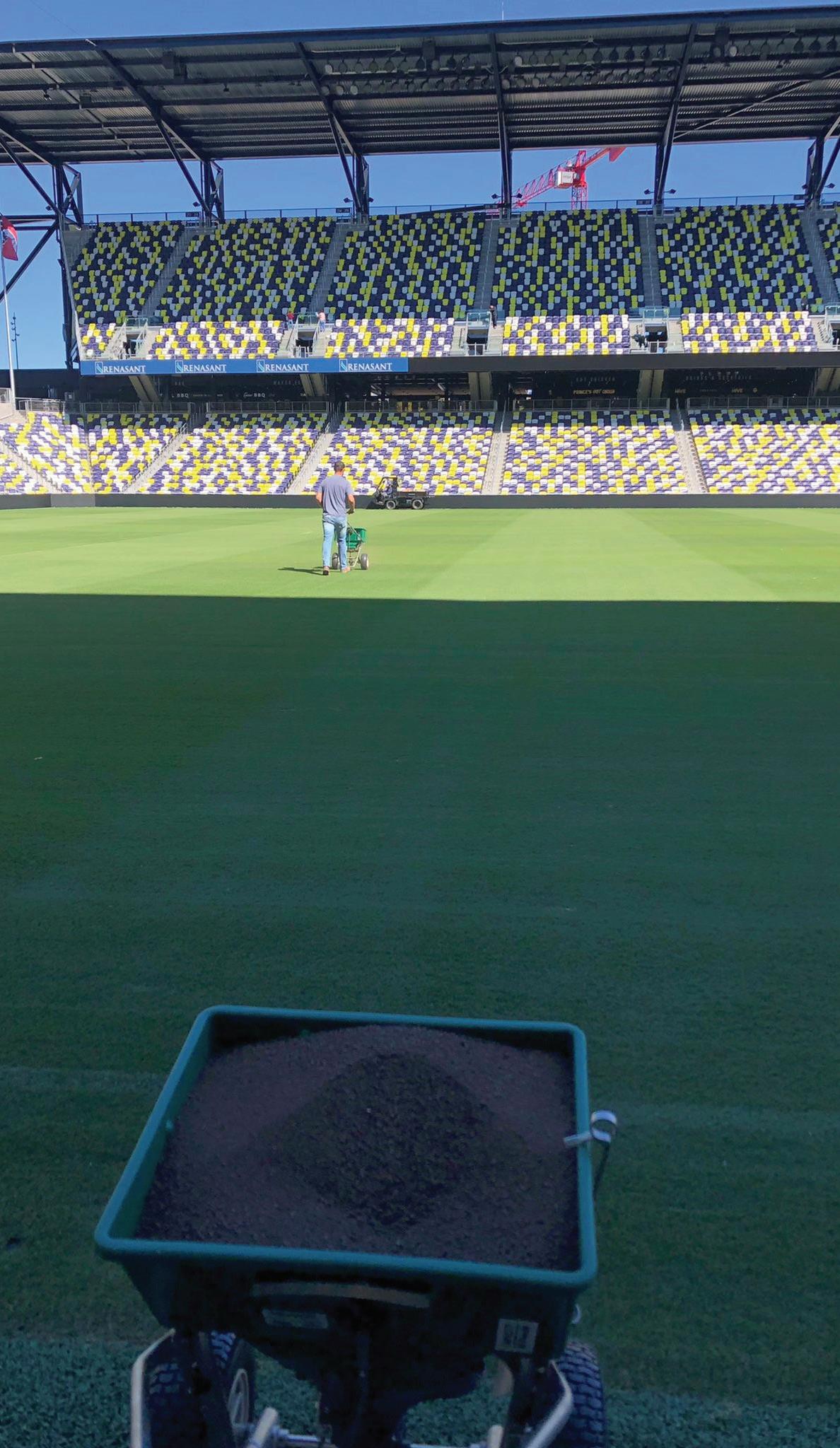
The rest is just working with the organization and educating them on what it takes to properly maintain facilities and the actual workload. It’s not just mowing. We could talk for hours about what goes into managing fields at this level. The demand where the first team trains six days a week, we have academy that trains five to seven days a week. They have their games at the Academy facility, and this year we’re getting into concerts.
We have three concerts on the books, and it also sounds like we’re going to be opening up the stadium fields a little bit more to other private events. We had a wedding on the field this year already, we’re also doing Summerfest, so the demand’s only growing. Last year, with it being our first year in the stadium, we were kind of protective over the field, we just wanted to make sure we get in, get everything figured out, put a good product on the field. This year it sounds like we’re going to start opening things up to other non-soccer events on the stadium field.
How did everything hold up after all the events?
I was very impressed with the field last year. I felt like there was a learning curve, especially with this being my first time growing grass in a stadium with a 360 canopy. I’ve had grow lights before, we had them at Dallas, but I still have areas on this field that don’t see sunlight August. through mid-May. We have to figure out how we can manipulate and grow those areas with just grow lights. It was a quick learning process, we laid this out in March, and we really hit our stride in August, and that was about the time when you really saw this field responding well.
I think we had eight home games in nine weeks from end of July to first week of September. Then sprinkle some trainings in there, and from event to event, game to game, we were recovering and bouncing back. You couldn’t even tell we’d played the last week at that point. We started really dialing in our program and our maintenance schedule and our lighting rotation by August. You always think you’ve got it figured out until something else comes at you, whether it’s a concert or a cold snap. It’s always adapting, every year is different. In my nine years in MLS, there’s never been a year that’s been the same for growing conditions. You just get a base plan and go off that and adjust as the year goes.

When you first came to Tennessee from Dallas, did that feel like a big learning curve?
It was night and day. Dallas is in the transition zone, we’re in the north transition zone here in Nashville. In Dallas, when you get ready to pull the plug on ryegrass, you’re getting consistent 90s, and it’s going to reach 100 degrees where that bermudagrass just jumps. It takes off and it doesn’t stop. Here, I feel like you might get a week in the 90s, if you’re lucky, in May. I don’t know if that has happened since I’ve been here. But even in June you might hit 90s and then that next week is going to be 80s or 70s, then that ryegrass comes firing back. In Dallas, we never chemically sprayed out ryegrass, we could always do it culturally. Whether it’s scalping, verticutting, pulling cores, watching our water – that ryegrass is going to go and the bermudagrass is going to take off.
My first year here in 2020, I tried to run the program we did in Dallas to transition, and I lost, so I ended up having to spray out the ryegrass. I think it was around 4th of July where I just couldn’t get the ryegrass to finally back off, so we ended up spraying it out. We had a pretty successful transition, then the next summer (2021), I think we had four weeks in the 90s. One in June, one in July and two in August. It’s been more difficult, especially in regards to the transition window, it’s been a lot harder to get the Bermuda up and going here than it was in Dallas.
The disease pressure is a lot higher here, I’ve noticed. Where in Dallas, I think the five years I was there, I never sprayed one fungicide on my training field. We’d spray fungicides, and put blankets out when we were putting flooring down. Here, you have to be on a preventative schedule maintenance, otherwise you’re going to get caught. That was the big part of the learning curve, just different climate. You’re still in the transition zone, but you don’t get the benefits of being in Dallas, where it’s hotter, it’s dryer, less humid. I’ve learned a lot the last four years for sure, growing grass in Tennessee.
Did you join TTA pretty soon after moving here?
It was one of the first things I did because I wanted to get my applicator’s license, and I did that through TTA. I wanted to start my networking, the best way to learn how to grow grass in an area is to talk to other turfgrass managers, so I joined the organization just to meet people and get that license and start learning as much as I could on the difficulties and challenges of growing grass in Tennessee.
I knew John Sorochan before I came to TN. I’ve had multiple conversations with him about things I’ve seen out here, and what to do, timing for your pre-emergent applications in Tennessee versus Dallas. I had my first run-in with nematodes in 2021. I’d never had a nematode, never seen it. I couldn’t figure it out. I’d solved the issues I was having on the grass fields out at Currey Ingram, but we were trying some things to correct it, and just couldn’t get it corrected.
I think I was having a conversation with Eric Holland with Precision Turf one day, and he was explaining to me about another field in Florida. He explained exactly what was going on in my field, so we took a nematode assay and came back and we were in threshold of damage. We sprayed a nemacide and moved forward.
That, and also armyworms. I hadn’t seen that until I was in Tennessee. We’ve had that a few rounds now, 2021 was a rough year. I was just walking the field at Currey, and I saw the worm and I recognized it right away. We got on top of it and didn’t have any damage from armyworms here.
Tell us about your family and what you do in your free time.
I came down here and it was just my wife and I. Since then we welcomed a little girl who’s now two years old. We are growing here in TN. We bought a house in Spring Hill and we do really enjoy life here. We live in a really good neighborhood, we know all of our neighbors and there’s front driveway hanging out or back patio hanging out with them.
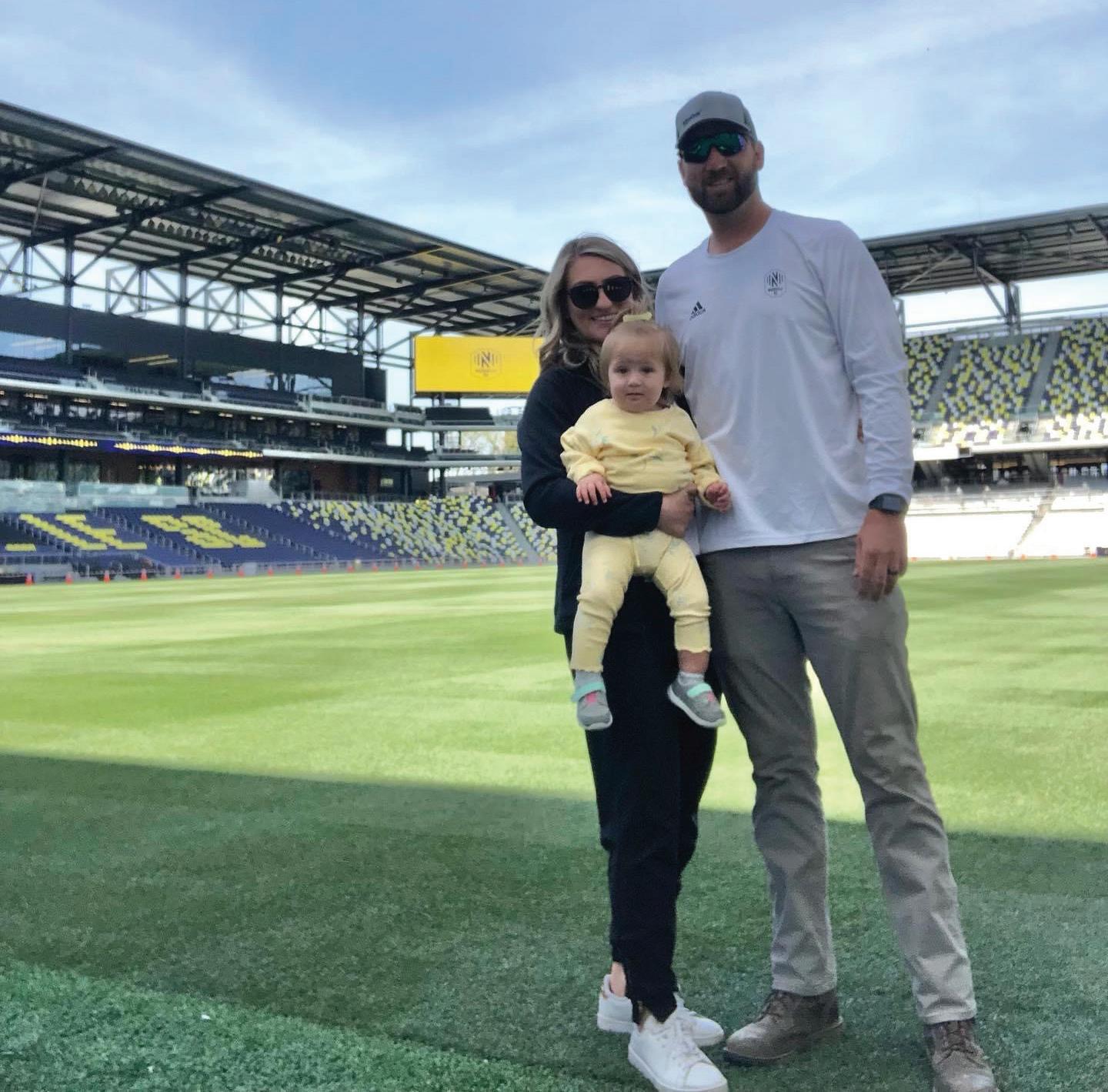
As we find time off, we do like go exploring, whether it’s hiking, or going to all the waterfalls around. We still haven’t made it up to Gatlinburg yet, it’s on the to-do list.
You’ve spent most of your turfgrass career in soccer. Was that because of your love for the sport or just job opportunity?
It was job opportunity. When I applied for the FC Dallas job, just seeing FC Dallas, I had no idea what it was. What I knew of Dallas’s professional soccer was Dallas Burn. So when clicked on the link and saw that it was professional soccer, I had no experience in soccer at this point, so I just applied for it to see what the competitiveness in soccer was, salary-wise. It just so happened that my boss at Dallas also worked at the Rangers and knew the head guy at the Rangers really well, so I got a good referral from the Rangers and ended up at FC Dallas.
Now being in it nine years, I understand the game a little better, watching training every day. But I didn’t grow up playing soccer, I was into baseball and football. We do have good atmosphere here at Geodis Park, I think we average 28,000 fans a game.
The atmosphere alone is fun, and we’ve been in the playoffs every year since we’ve been in the MLS. Coach Gary puts out a great product year-in and year-out and it’s fun to watch.
What is one lesson you’ve learned the hard way in your career?
The hardest thing for me, especially starting here in Nashville, hiring people was learning to trust my assistants, allow them to be on their own and taking loads off my plate. I can’t be everywhere every day, so learning to let go of some things and let them handle it. They’ve made it easy to do that, they’ve done a great job handling their own facilities, so it’s taken a lot of work off my plate, but it was hard at first giving up that. I’m particular in how I do things and how I want things done, but learning that they might not do it the same way, but it gets done properly and at the end of the day it’s a good outcome.
What would be your advice for people entering the industry now?
My advice has always been internships. I think internships are huge. You’re going to figure out whether baseball or soccer is right for you. We started an internship in Dallas where we partnered with a golf course. Half the summer you were soccer, the other half you were golf, then we flipped the interns. That’s the time, when you’re in college, you don’t really have a lot of commitments, and you can move around the country. Figuring out what sport is right for you, whether it’s golf, football, soccer, baseball. It’s also the best way to get your name around. I tell interns all the time, when you intern for a club, you’re interning for every club out there. I know every head turf manager in soccer, I have most of them in my phone, where if I see somebody who applies for me, I’ll get a referral. I think internships are the most important thing to do to get your foot in the door or just to get your name around the organization.





